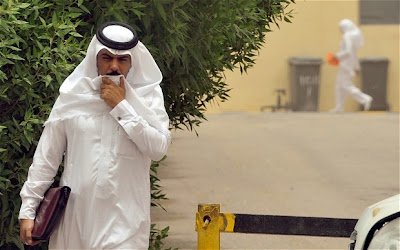But there is definitely something going on in Saudi Arabia and other parts of the Middle East as a new virus is taking a toll - 38 people alone have died from it in Saudi Arabia.
They've named it MERS...I'd prefer to call it GODSENT.
The story comes from The Telegraph.
World Health Organisation calls emergency meeting to respond to SARS-like outbreak
Health experts have started an emergency international meeting to devise ways of combating a mysterious virus that has been described as the single biggest worldwide public health threat after claiming 38 lives, mostly in Saudi Arabia.
Amid fears of a new pandemic more deadly than Sars, 80 officials and doctors, including two from Britain, gathered in Cairo yesterday to examine ways of tackling Middle East Respiratory Syndrome, dubbed MERS.
The coronavirus is casting a shadow over the annual Muslim pilgrimages to Saudi Arabia, where four new deaths were announced on Monday.
The three-day meeting called by the World Health Organisation will look at developing guidelines for Ramadan. In October, more than two million people are expected to attend the Hajj pilgrimage to Mecca.
"Everyone is very aware of the fact that Ramadan begins next month and that there will be a large, large movement of people in a small crowded spaces," said Gregory Hartl, a spokesman for the WHO. "So the more we know about this virus before that starts the better."
There are also concerns that tourists could bring the virus back to their home countries. It appears to have an incubation period of up to 12 days and a fatality rate of 60 per cent.
Cases have also been found in Britain, France, Germany, Italy, Tunisia and Jordan. Most were patients transferred home from the Middle East for treatment or people who had travelled to the region and became ill after they returned.
Dr Jon Bible, a clinical scientist, who treated one of the three British cases last year, said: “You don’t want to have this.”
Sufferers, he said, “are very close to death at all times. They are in respiratory distress at all times, it’s like a very serious pneumonia”.
His patient at St Thomas’s Hospital survived after several months of artificial respiration and even now has breathing difficulties.
The relief for authorities is that it has not yet mutated so as to gain the ability to jump easily from person to person.
Mr Hartl said: “We have been lucky it hasn’t started to spread in any sustainable way between humans. We still have time, but we have to use that time to act.”
An international team of doctors who investigated nearly two dozen cases in eastern Saudi Arabia found the virus has some striking similarities to SARS, which killed 800 people around the world as it spread a global health panic in 2003.
Unlike SARS, though, scientists remain baffled about the source of the new virus, which was first reported in April 2012.
The symptoms of both are similar, with an initial fever and cough that may last for a few days before overpowering pneumonia develops.
"To me, this felt a lot like SARS did," said Trish Perl, a senior hospital epidemiologist at Johns Hopkins Medicine, who was part of the team. Their report was published in the New England Journal of Medicine.
Dr Perl said they pinpoint how it was spread in every case - through droplets from sneezing or coughing, or a more indirect route.
The team was alarmed to find MERS only spread within hospitals, even though some hospital patients were not close to the infected person.
"In the right circumstances, the spread could be explosive," said Dr Perl.
What is of particular concern is the high fatality rate of the virus. It has caused death in about 60 percent of patients so far, with 75 percent of cases in men and most in people with serious health conditions. There are currently no known treatments.
Margaret Chan, WHO director-general, previously called MERS a “threat to the entire world”.
Dr Dipti Patel, joint director of Public Health England’s National Travel Health Network and Centre, said: “Given that there have only been a relatively small number of confirmed MERS-CoV coronavirus cases worldwide, people planning to travel to the Middle East should continue with their plans but follow the general advice about staying safe and healthy when travelling, and especially the available guidance on the Hajj and Umrah."

2 comments:
G-d has created it. G-d has sent his punishment on them. Unfortunately there is the problem of this coming to the West.
We should have a cure in a few years. I understand the Israelis are working hard on it now.
I told y'all to leave those goats alone!
Post a Comment